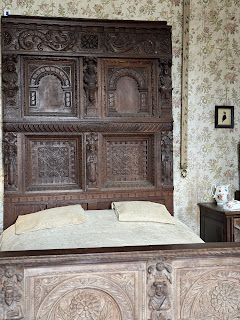The beauty of Chastleton House is that it has remained within the same family for much of its existence, and because for much of that time family fortunes varied – usually for the worst – its upkeep suffered and improvements were few. So what you see is a perfect Jacobean house albeit shabby. When the National Trust took over, they decided the tradition would be maintained. And so, you walk through its faded glory expecting ghosts at every corner.
The house was built between the years of 1607 and 1612 by a prosperous wool merchant, Walter Jones. He had high aspirations, but his descendants blew it, going against the grain of history and taking the losing side on every occasion. Royalist or Jacobite, it didn’t matter. They went for it. The owner of Chastleton in the 1930’s and 40’s, Irene Whitmore Jones, would tell visitors that the family had lost all their money ‘in the war,’ referring not to the First World War but the Civil War 300 years earlier.
long Gallery
The bedroom
The location of secret closet lost during later renovations
Arthur’s grandson, Walter Jones III inherited the house in 1688 aged 14. As an adult, he made some much-needed improvements with the help of his wife’s dowry (Anne Whitmore) and the financial support of his wife’s brother, Sir William Whitmore. Even so, when Walter died in 1704, he left Anne, four children, and an estate heavily in debt.
Wonderful panelling
A particularly ornate bedroom ad magnificent tapestries
Make do and mend. The end of this bed is part of a re-purposed door. The sharp sighted might even discover the keyhole.
His heir, John Jones was six years old so Anne ran the estate for him and returned it to solvency – which he had blown by the time he died in 1738.
The next heir, Henry Jones was imprisoned in Oxford gaol for debt. His successors, John Jones II and Arthur Jones II made stalwart efforts to make much needed repairs and on Arthur’s death in 1828, the estate passed sideways to a distant cousin, John Henry Whitmore-Jones.
But beer in small goblets is compensated by this wonderful C17th tapestry.
The story of bad luck and ne’er-do-wells continued in the C19th, with the women, by and large coming to the rescue. For much of this time, the house was rented as money ran short. Irene Whitmore Jones became sole custodian in 1917 after the death of her husband. By 1936 she had been forced to sell the entire estate of 1,250 acres and five farms, leaving just her and a butler called Wing, and a maid called Old Sarah. In the 1940s she was reduced to opening Chastleton to paying guests.
In 1954 Barbara and Alan Clutton-Brock inherited Chastleton, the latter being a distant relative of the Whitmore-Jones family. The couple were energetic bohemians, hosting the likes of George Orwell, E.M Forster, and fringe members of the Bloomsbury Group. They embraced the nature of the house they’d inherited, Barbara pointing out that ‘Poverty is a great preservative.'
After the death of her husband Barbara stayed, refusing to abandon the house. She lived alone but for her 20 cats and a parrot, inhabiting a few rooms on the ground floor and a bedroom. Her allowance was supplemented by the occasional paying visitor. The lady was indomitable, wiring part of the house herself and chivvying her daughter to get up there and repair the roof when occasion demanded. It took its toll upon her, once admitting she had never been warm in her life.
One of the rooms Barbara lived in after her husband died. I loved the small period details.
Her bedroom with its 1590's tapestry
After fifteen years of living alone in this large, freezing cold house, wandering around like a pea in her Jacobean pod. . .
Original implements
Jacobean hearth with the later 'modern' cast iron range


































